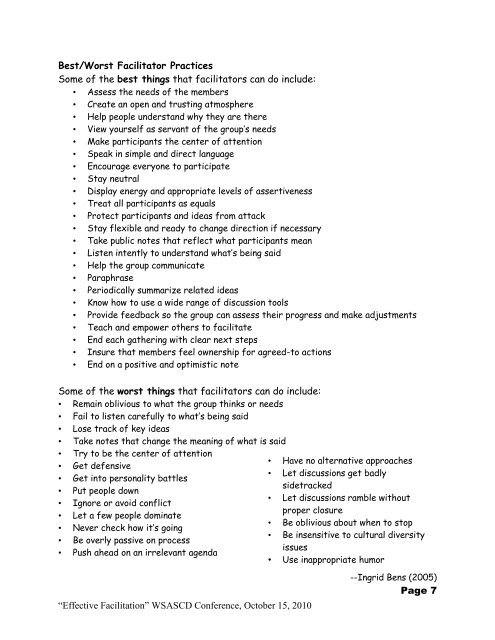3hPlSq
3hPlSq
3hPlSq
You also want an ePaper? Increase the reach of your titles
YUMPU automatically turns print PDFs into web optimized ePapers that Google loves.
Best/Worst Facilitator Practices<br />
Some of the best things that facilitators can do include:<br />
• Assess the needs of the members<br />
• Create an open and trusting atmosphere<br />
• Help people understand why they are there<br />
• View yourself as servant of the group’s needs<br />
• Make participants the center of attention<br />
• Speak in simple and direct language<br />
• Encourage everyone to participate<br />
• Stay neutral<br />
• Display energy and appropriate levels of assertiveness<br />
• Treat all participants as equals<br />
• Protect participants and ideas from attack<br />
• Stay flexible and ready to change direction if necessary<br />
• Take public notes that reflect what participants mean<br />
• Listen intently to understand what’s being said<br />
• Help the group communicate<br />
• Paraphrase<br />
• Periodically summarize related ideas<br />
• Know how to use a wide range of discussion tools<br />
• Provide feedback so the group can assess their progress and make adjustments<br />
• Teach and empower others to facilitate<br />
• End each gathering with clear next steps<br />
• Insure that members feel ownership for agreed-to actions<br />
• End on a positive and optimistic note<br />
Some of the worst things that facilitators can do include:<br />
• Remain oblivious to what the group thinks or needs<br />
• Fail to listen carefully to what’s being said<br />
• Lose track of key ideas<br />
• Take notes that change the meaning of what is said<br />
• Try to be the center of attention<br />
• Get defensive<br />
• Get into personality battles<br />
• Put people down<br />
• Ignore or avoid conflict<br />
• Let a few people dominate<br />
• Never check how it’s going<br />
• Be overly passive on process<br />
• Push ahead on an irrelevant agenda<br />
• Have no alternative approaches<br />
• Let discussions get badly<br />
sidetracked<br />
• Let discussions ramble without<br />
proper closure<br />
• Be oblivious about when to stop<br />
• Be insensitive to cultural diversity<br />
issues<br />
• Use inappropriate humor<br />
“Effective Facilitation” WSASCD Conference, October 15, 2010<br />
--Ingrid Bens (2005)<br />
Page 7


